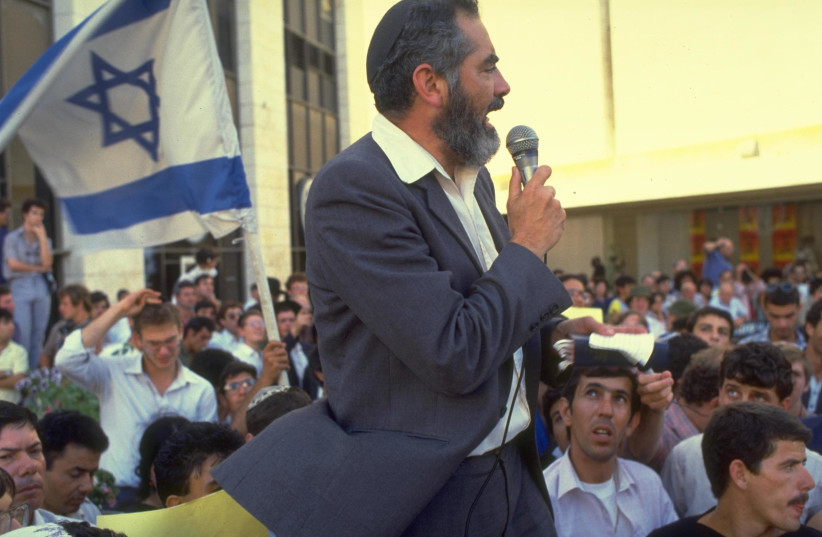“Give me the power!” demanded one of Israel’s most memorable election slogans, “I’ll take care of them.”
“I” was Meir Kahane, “them” were “the Arabs,” and the year – how proverbial – was 1984. The racist firebrand was elected with just 26,000 votes, at a time when the electoral threshold was 1%. Still, his election shocked the Right, which boycotted his addresses along with the rest of the Knesset.
This, then, was the backdrop against which president Chaim Herzog faced the 11th Knesset’s plenary, including the man who preached population transfer and also claimed democracy contradicted Judaism.
“This is the time to remember what we fought for,” said Herzog, and warned: “History has known many democracies which collapsed in times of crisis; we, too, are not immune.”
Underscored by an electoral tie and an economic meltdown, the crisis was much larger than Kahane. Herzog thus set out to impose on the politicians a Right-Left coalition.

The result was the rotation government that defeated hyperinflation, re-stabilized the political system and, while at it, relegated Kahane to the political margins, where he languished for the rest of his parliamentary stint.
Now Kahane’s disciples are about to enter the security cabinet, while the country faces a constitutional crisis as harsh as 1984’s economic crisis.
Israel faces a new constitutional crisis
This is the context in which President Isaac Herzog reportedly considered repeating his father’s feat by inspiring a Netanyahu-Lapid government that would exclude the Kahanists. The quest is noble, but in today’s setting it prescribes political aspirin to a patient begging constitutional surgery.
THE CURRENT crisis is not about prices, taxes, duties and tariffs, but about the status of our judges and the power of our courts.
The struggle is raging on two tiers: the marble floors, where battle-hungry lawmakers point swords at the judiciary, and the street, where the people are split between those who believe in the power of justice and those who believe in the justice of power.
Both tiers’ hotheads are fueled by the prime minister-elect’s allegations that judges, prosecutors, journalists and cops conspired to unseat him. There is no reconciling their differences as long as defendant No. 1 remains at center stage.
Moreover, unlike 1984, this election produced a victor, and the victor has no intention – not to mention motivation – to share power with the opposition. On the contrary, the emerging coalition’s members lost no time releasing a range of constitutional provocations.
One newly elected lawmaker, Likud’s Tali Gottlieb, said this week that if the High Court of Justice overrides legislation, its rulings should be ignored. What next, one wonders: drivers ignoring stop signs? Shoppers ignoring cashiers? Doctors harvesting organs?
Former Likud minister Dudi Amsalem – who wants to be the next justice minister – was even more inventive, calling for deleting from Israel’s criminal code the offenses of fraud and breach of trust. What such a move would mean to simple people – a license to cheat each other – apparently means nothing to this lawmaker, who does not understand that part of his role is to set an educational example.
Most frighteningly, ultra-Orthodox sage Yisroel Hager, the Rebbe of Vizhnitz, instructed his lawmakers to demand as an ultimatum the passage of an overriding clause. The clause would mean that a simple majority of 61 lawmakers would suffice to make law whatever the High Court of Justice rules as unconstitutional.
On the abstract level, this would mean imposing the politicians on the judges, in the spirit of what has been happening in recent years in Hungary and Poland. But the Rebbe doesn’t care about abstractions. He cares about his followers’ draft.
The courts are the ones that repeatedly undid legislative attempts to twist the draft law so that ultra-Orthodox boys will not serve in the army. The courts did this because such legislation would violate the principle of equality before the law. Ultra-Orthodoxy, however, doesn’t care for equality. It cares for its ghetto, and now detects an opportunity to raise its walls and further prize its dwellers, at our expense.
The question, therefore, arises: if the emerging coalition is so reactionary, so victorious and so brazen, and if a Middle Israeli coalition of the sort Herzog wants is so unobtainable, what should he do? Well, he should deliver the constitutional convention Israel has never held.
UNLIKE NETANYAHU’S farfetched allegations, the constitutional crisis we face is not his fault, nor is it his invention. The notion that the Israeli High Court assumed excessive powers is shared by serious people on the Left, including law professors Amnon Rubinstein and Daniel Friedman, political scientist Shlomo Avineri and former interior minister Haim Ramon.
People like them should be invited by Herzog to a forum that will include prominent right-wing figures, led by former president Reuven Rivlin and joined by the likes of former justice minister Tzachi Hanegbi and former education minister Limor Livnat.
To this Right-Left group the president would add a consensual ultra-Orthodox figure, perhaps Adina Bar-Shalom, daughter of the late Rabbi Ovadia Yosef and an Israel Prize laureate; an Arab jurist like former Supreme Court justice Salim Joubran, and prominent rabbis, like Religious Education Board Chairman Prof. Yehuda Brandes and novelist Haim Sabato, head of Yeshivat Birkat Moshe in Ma’aleh Adumim.
This eclectic forum will be given 18 months to produce by consensus a blueprint for redefining relations between the judiciary, legislative and executive branches. As long as the forum deliberates, all constitutional legislation will be suspended. Once its blueprint hatches, it will likely be made law, even by the current Knesset.
That is how the constitutional crisis will end, the Israeli consensus will be restored, the legislative process will be decontaminated and the second Herzog presidency will be as meaningful as the first, maybe even more.
www.MiddleIsrael.net
The writer, a Hartman Institute fellow, is the author of the bestselling Mitzad Ha’ivelet Ha’yehudi (The Jewish March of Folly, Yediot Sefarim, 2019), a revisionist history of the Jewish people’s political leadership.
